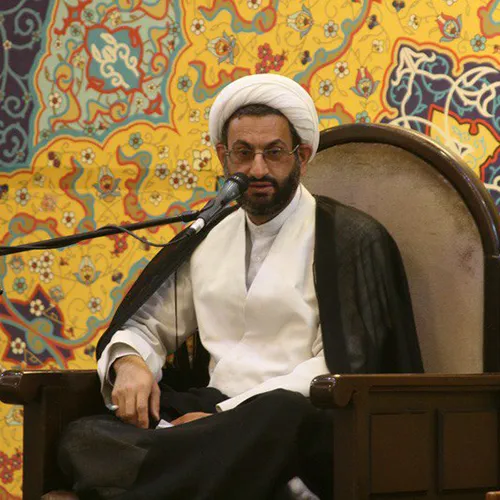Hojjat al-Islam Vahidpour
Minbars (pulpits) are always an opportunity to present religious rulings, including during Friday prayers. Hojjat al-Islam Vahidpour, a prominent religious expert, mentioned this in an interview with this week’s Friday Bulletin. He emphasised that Friday and congregation prayer leaders must have specific qualities to effectively use this opportunity for outreach and impact. This religious expert has travelled to many countries, including Europe, and is well-known for presenting religious rulings. Hojjat al-Islam Vahidpour typically provides brief answers to questions, which is one of his defining features.
- Hojjat al-Islam Vahidpour, could you tell us which countries you have travelled to? For what purpose, and what is your best overseas memory?
My overseas travels have been seven or eight times, and each trip has involved visiting several cities within those countries. These trips have been both for religious and promotional purposes. The most frequent travels were to Saudi Arabia and Iraq, where I visited the holy sites around thirty times. I typically travelled as a spiritual leader for pilgrimage groups. Even after many years, many of my fellow travellers still greet me warmly, and they treat me like a close friend or brother. This is one of the beautiful memories from my pilgrimage trips. The reason for this affection is my effort to maintain good manners with others, as I am careful about how I behave.
Secondly, I had academic trips to Lebanon and Syria. Before the rise of ISIS, around ten years ago, I visited these countries for academic exchanges, visiting universities and seminaries. The goal was to foster dialogue between different religious denominations and to discuss with university professors in these two countries. The second type of trips was for religious outreach. One Ramadan, I spent time in India, and I also spent several years in Germany, participating in conferences with religious scholars from neighbouring countries, where I presented and explained the relevant religious rulings. Thank God, I had many blessings from these experiences.
- Why does the focus on religious rulings become more pronounced during the holy month of Ramadan?
I will answer this clearly. Since Ramadan is a month of worship and spiritual closeness, people tend to feel a stronger need to understand religious rulings and learn about the foundations of their faith. Muslims, who are committed to observing the fast during this month, feel the need to learn about what is lawful and unlawful. In the rest of the year, various distractions might cause forgetfulness, but during Ramadan, we are more reflective, realising that we need to draw closer to God. Naturally, we need to know how to do this—what is permissible and impermissible, the rules of life according to the law. Moreover, every Muslim wants to ensure their fast is correct. So, learning the rulings on fasting and prayer is essential to fulfilling their religious duties correctly. In fact, this sense of responsibility and need increases in Ramadan.
- What is the most important religious ruling during Ramadan?
In my opinion, the most important religious ruling in Ramadan is that since this month is a test and a form of spiritual training—essentially a spiritual workout—it encourages us to even forgo permissible things. The goal is to submit to God’s will during this trial and emerge successfully, so that we can remain humble servants of God throughout the remaining eleven months of the year. After this trial, we should be in total submission to God, so that after a month of sincere worship in Ramadan, a fasting person will not resist God’s will in the rest of their life and will not question any divine decree, no matter what hardship or challenge they face.
- Among the four Islamic qualities—intention, selflessness, generosity, and leading in good deeds—which one would you prefer?
I would choose intention, as intention is the soul of our actions, and it makes worship meaningful. For example, someone may excel in leading in good deeds or selflessness, but if the soul of the act is missing, it becomes hollow. If someone, God forbid, acts with the intention of showing off, or with ulterior motives, the act lacks sincerity. Intention, on the other hand, is what imbues human actions with spirit. Selflessness and similar qualities are the skeleton or outward appearance of deeds, akin to a body without a soul. Intention is about performing actions purely for God’s sake, in solitude. Therefore, it is intention that gives value to an act, and God rewards actions that carry this soul with blessings.
- This interview is for the Friday Prayer Bulletin. How much of an opportunity is Friday Prayer to present religious rulings each week?
Regarding the presentation of religious rulings, it’s not my focus to discuss the features of the Friday prayer sermon that make it engaging and meet the needs of the audience, but the content of the sermon is crucial. It should address what the people truly need, such as sound and steadfast beliefs, moral issues, and, importantly, religious laws. In Friday sermons, religious rulings should have a special place. In my view, Friday prayer leaders should focus on these points, as long as they are both knowledgeable in the rulings and can present them in a way that resonates with the audience. It’s important that religious rulings are communicated clearly and accessibly so that the audience doesn’t feel uncomfortable. Although religious laws may seem restrictive, presenting them is like a doctor advising a patient on which foods to eat or avoid—these are limitations, but people feel that the doctor cares for them. If Friday prayer leaders and we, as religious scholars, can create the same sense in the people—that these rulings are being presented for their happiness and salvation—then the acceptance of these rulings will be much easier and more impactful.
editor's pick
news via inbox
Subscribe to the newsletter.




